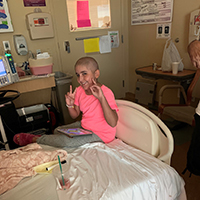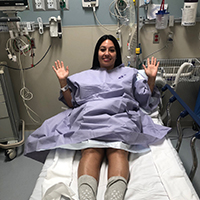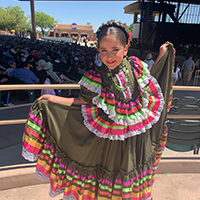Novel clinical trial saves 12-year-old Savannah in her third cancer battle
11/02/2020
Savannah started kindergarten
and began living a normal life,
which included her love of ballet
folklorico – traditional Mexican
folk dancing.
Every year, 16,000 children under the age of 19 learn they have cancer. In Southern Arizona, about 60 children – or, nearly two classrooms of kids – begin their own cancer journeys. Leukemia, lymphoma and brain tumors are among the most common cancers affecting children. A hematological disease, leukemias are cancers of the bone marrow and blood and occur at the highest rate, accounting for almost 1 out of 3 cancers in children.
Not only was Savannah Perez one of those 60 children, the Tucson resident has battled acute lymphoblastic leukemia three times – starting at age 3, with a grueling three years of treatment. “That was something a child should never have to go through,” says Savannah’s mom, Vanessa. “Even so, she was spunky and always had the best spirit.”
Her leukemia went into remission; Savannah started kindergarten and began living a normal life, which included her love of ballet folklorico – traditional Mexican folk dancing. Then, she relapsed and began another three years of treatment. After another remission and relapse, her doctors conveyed that Savannah would need a bone marrow transplant this time.
In the United States, most children and teens with cancer are treated at a center that is a member of the Children’s Oncology Group (COG); these centers are all associated with a university or children’s hospital. Fortunately, pediatric cancer patients in Tucson and other Southern Arizona communities have access to both. Banner Children’s at Diamond Children’s Medical Center is the only pediatric medical facility in Arizona connected to an academic research facility — the University of Arizona Steele Children’s Research Center, within the Department of Pediatrics — where physician-scientists conduct groundbreaking basic science and translational research to advance children’s health.

Savannah on the day of her transplant
at Banner Children’s at Diamond
Children's Medical Center.
A highly-specialized and exceptionally dedicated team, the Division of Pediatric Hematology-Oncology and Hematopoietic Cell Therapy and Transplant provides the foremost level of care and support for children, like Savannah, with cancer and blood disorders – from leukemia, lymphoma to solid tumors, including brain tumors to anemias, and bleeding disorders.
Led by Dr. Emmanuel Katsanis, Division Chief of Banner Children’s/University of Arizona state-wide Pediatric Blood and Cancer Program, the specialized physicians and nurse practitioners treat between 600-800 patients a month, with that number continuing to rise.
Dr. Katsanis consulted with Vanessa about a novel clinical trial, for which he serves as principal investigator – Haploidentical Bone Marrow Transplant with Post-Transplant Cyclophosphamide and Bendamustine. Very basically, a bone marrow transplant that involves a half-matched donor, which can be a parent or a sibling, with a new post-transplant regimen that is being tested.
Because full matches are often very difficult to find, particularly for Hispanic, African and Native American patients, Vanessa did not hesitate to be a “half” or 50% bone marrow match for Savannah – along with participating in this groundbreaking clinical trial that promised fewer side effects.
Both Savannah and Vanessa came through the transplant with stunning success. In fact, Vanessa insisted on being taken directly to Savannah’s room after the bone marrow was taken from her hips, in order to to see the first drops of life-saving marrow administered to Savannah. “Not only did I bring her into the world,” Vanessa says, “but, I would be able to save her life.”

Vanessa Perez, Savannah's mom,
did not hesitate to be a 50% bone
marrow match for Savannah.
A year after their groundbreaking transplant and participation in the clinical study, Savannah is free of disease and in remission. She is attending school online and dancing again. And, both mother and daughter are looking forward to the new, remodeled Pediatric Cancer Clinic, which will update the current space that has wholly outgrown its functionality, while the need for more room is not just a “wish list” item, but a necessity. The new clinic space will be welcoming, designed “through the eyes of a child,” with extras, based on fundraising capacity, that include interactive games and hands-on things to do while patients spend long hours waiting or receiving treatment; an outdoor play space; and patio area that accommodates the comfort and needs adult parents, too.
More than ever, this expanded and renovated new clinic space is greatly needed to serve an increased volume of young patients, use space more efficiently and incorporate whimsical, non-medical elements that embrace the notion of childhood.
“Our young patients deserve the best and we hope to be able to offer them the finest care possible in this new, state of the art clinic,” says Dr. Katsanis, who is recognized internationally for his research in hematopoietic cell transplantation.
Our ability to continue supporting advancements in pediatric oncology depends on philanthropic support. Gifts at all levels are welcome. Invest in the health of our communities, now and in the future, with a tax-deductible gift to the Banner Health Foundation. Donate online by clicking below.


